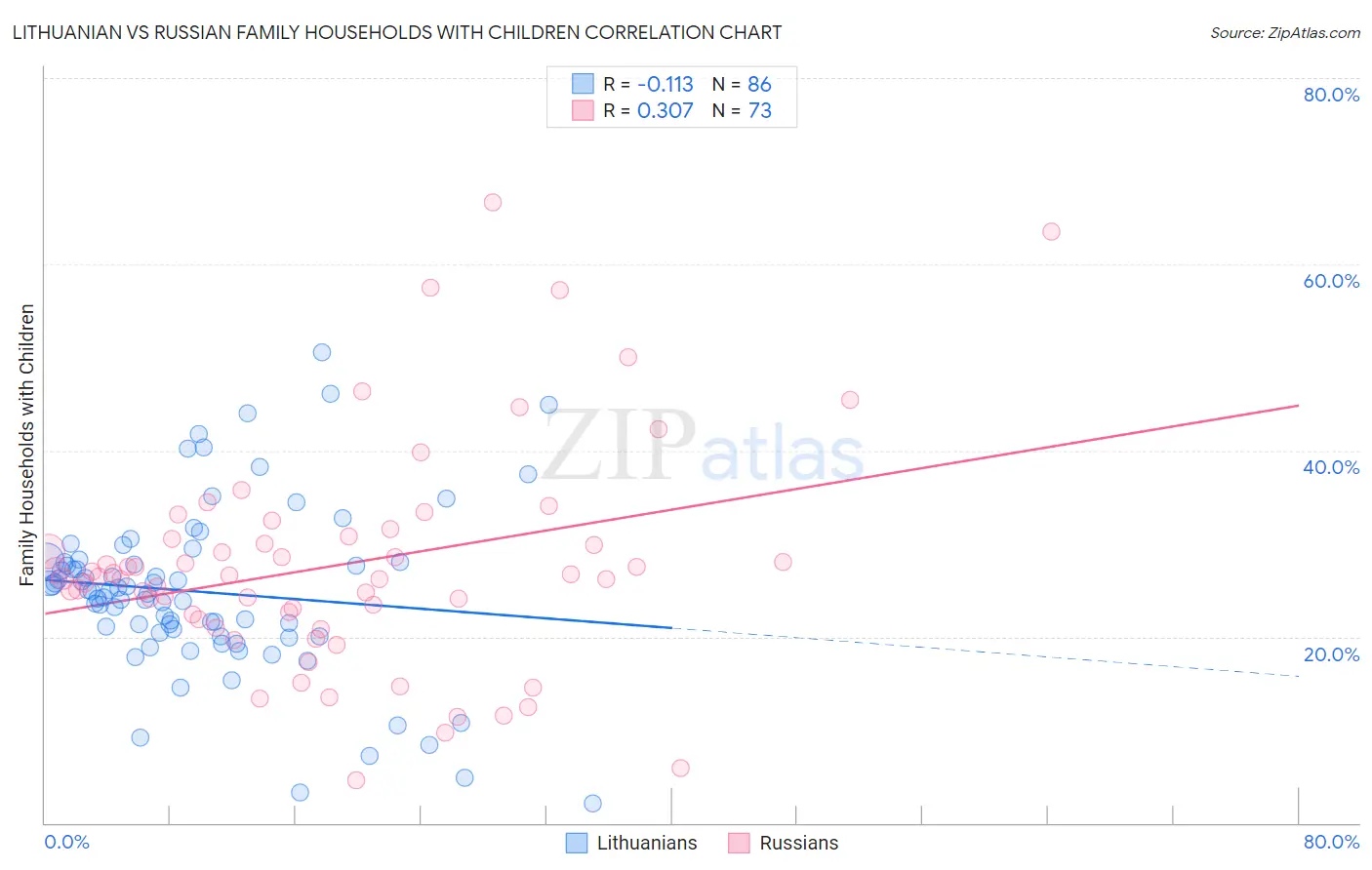Lithuanian vs Russian Family Households with Children
COMPARE
Lithuanian
Russian
Family Households with Children
Family Households with Children Comparison
Lithuanians
Russians
26.6%
FAMILY HOUSEHOLDS WITH CHILDREN
0.3/ 100
METRIC RATING
281st/ 347
METRIC RANK
26.5%
FAMILY HOUSEHOLDS WITH CHILDREN
0.2/ 100
METRIC RATING
288th/ 347
METRIC RANK
Lithuanian vs Russian Family Households with Children Correlation Chart
The statistical analysis conducted on geographies consisting of 421,521,006 people shows a poor negative correlation between the proportion of Lithuanians and percentage of family households with children in the United States with a correlation coefficient (R) of -0.113 and weighted average of 26.6%. Similarly, the statistical analysis conducted on geographies consisting of 511,427,529 people shows a mild positive correlation between the proportion of Russians and percentage of family households with children in the United States with a correlation coefficient (R) of 0.307 and weighted average of 26.5%, a difference of 0.20%.

Family Households with Children Correlation Summary
| Measurement | Lithuanian | Russian |
| Minimum | 2.2% | 4.6% |
| Maximum | 50.6% | 66.7% |
| Range | 48.4% | 62.1% |
| Mean | 24.8% | 27.7% |
| Median | 25.0% | 26.5% |
| Interquartile 25% (IQ1) | 20.4% | 22.2% |
| Interquartile 75% (IQ3) | 28.1% | 30.6% |
| Interquartile Range (IQR) | 7.7% | 8.5% |
| Standard Deviation (Sample) | 9.1% | 12.0% |
| Standard Deviation (Population) | 9.0% | 11.9% |
Demographics Similar to Lithuanians and Russians by Family Households with Children
In terms of family households with children, the demographic groups most similar to Lithuanians are French American Indian (26.6%, a difference of 0.010%), Immigrants from North America (26.6%, a difference of 0.080%), Senegalese (26.6%, a difference of 0.090%), Immigrants from Canada (26.5%, a difference of 0.10%), and Finnish (26.6%, a difference of 0.12%). Similarly, the demographic groups most similar to Russians are Immigrants from Senegal (26.5%, a difference of 0.020%), Shoshone (26.5%, a difference of 0.020%), Immigrants from Sweden (26.5%, a difference of 0.050%), Cambodian (26.5%, a difference of 0.070%), and Immigrants from Canada (26.5%, a difference of 0.10%).
| Demographics | Rating | Rank | Family Households with Children |
| Eastern Europeans | 0.6 /100 | #274 | Tragic 26.7% |
| Immigrants | Northern Europe | 0.5 /100 | #275 | Tragic 26.7% |
| Immigrants | Spain | 0.5 /100 | #276 | Tragic 26.6% |
| Celtics | 0.4 /100 | #277 | Tragic 26.6% |
| Immigrants | Europe | 0.4 /100 | #278 | Tragic 26.6% |
| Finns | 0.4 /100 | #279 | Tragic 26.6% |
| Senegalese | 0.4 /100 | #280 | Tragic 26.6% |
| Lithuanians | 0.3 /100 | #281 | Tragic 26.6% |
| French American Indians | 0.3 /100 | #282 | Tragic 26.6% |
| Immigrants | North America | 0.3 /100 | #283 | Tragic 26.6% |
| Immigrants | Canada | 0.3 /100 | #284 | Tragic 26.5% |
| Cambodians | 0.2 /100 | #285 | Tragic 26.5% |
| Immigrants | Senegal | 0.2 /100 | #286 | Tragic 26.5% |
| Shoshone | 0.2 /100 | #287 | Tragic 26.5% |
| Russians | 0.2 /100 | #288 | Tragic 26.5% |
| Immigrants | Sweden | 0.2 /100 | #289 | Tragic 26.5% |
| Albanians | 0.2 /100 | #290 | Tragic 26.5% |
| Bahamians | 0.2 /100 | #291 | Tragic 26.5% |
| Poles | 0.2 /100 | #292 | Tragic 26.5% |
| Blacks/African Americans | 0.1 /100 | #293 | Tragic 26.5% |
| Latvians | 0.1 /100 | #294 | Tragic 26.4% |